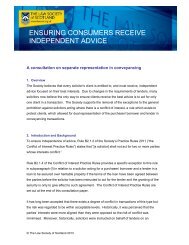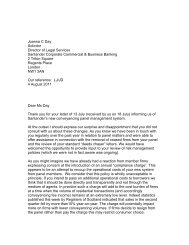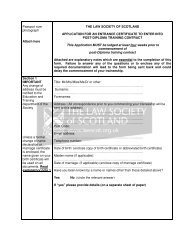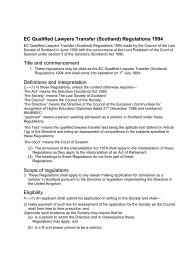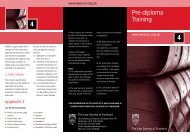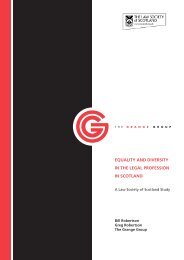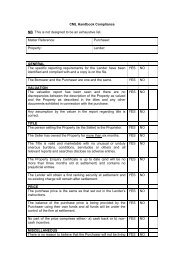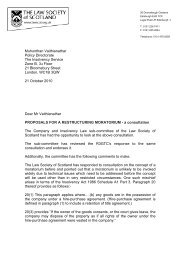Slides - Law Society of Scotland
Slides - Law Society of Scotland
Slides - Law Society of Scotland
You also want an ePaper? Increase the reach of your titles
YUMPU automatically turns print PDFs into web optimized ePapers that Google loves.
ILG - Seminar<br />
Court Procedures, Rules & Tactics<br />
Jacqueline Harris, Partner<br />
14 March 2013
Introduction<br />
• Focus on court procedures used by commercial clients<br />
• Court <strong>of</strong> Session/Sheriff Court<br />
– Ordinary actions<br />
– Commercial actions<br />
• Consideration <strong>of</strong> the range <strong>of</strong> options as between:-<br />
– Court<br />
– Procedure<br />
– Tactical considerations
Choice <strong>of</strong> Forum<br />
• Range <strong>of</strong> options<br />
– Court <strong>of</strong> Session<br />
– Sheriff Court<br />
– Alternative Dispute Resolution<br />
• Mediation<br />
• Arbitration<br />
• Expert Determination
Choice <strong>of</strong> Forum<br />
• Why choose Sheriff Court over Court <strong>of</strong> Session or Vice Versa<br />
• Because you have to:-<br />
• Statutory Limits<br />
– Court <strong>of</strong> Session - only available for causes exceeding £5000<br />
(s7 Sheriff Courts (<strong>Scotland</strong>) Act 1907)<br />
– Sheriff Court ordinary action – £5001 +<br />
– Summary cause - £3001 to £5000 (s35(1) Sheriff Courts<br />
(<strong>Scotland</strong>) Act 1971)<br />
– Small claims – up to £3000 (Small Claims (<strong>Scotland</strong> Order 1988)<br />
– All sums are exclusive <strong>of</strong> interest and expense<br />
• Exclusive Jurisdiction
Choice <strong>of</strong> Forum<br />
• When to litigate in the Court <strong>of</strong> Session<br />
– Factors to Consider<br />
• Specialist courts and judges<br />
• Commercial procedure (not available in every<br />
Sheriff Court)<br />
• Availability <strong>of</strong> remedy e.g. positive interim orders<br />
• Employment <strong>of</strong> Counsel<br />
• Timing<br />
• Cost<br />
• Location<br />
• Client attitude
Choice <strong>of</strong> Forum<br />
• When to litigate in the Sheriff Court<br />
– Factors to Consider<br />
• Location/Accessibility<br />
• Availability <strong>of</strong> the Commercial procedure<br />
(Glasgow, Aberdeen, Jedburgh, Selkirk, Duns and<br />
Peebles)<br />
• Rights <strong>of</strong> audience<br />
• Cost<br />
• Pressure <strong>of</strong> business – priority for crime<br />
• Lack <strong>of</strong> specialism<br />
• Identity/location <strong>of</strong> opponent
Which Procedure<br />
• Court <strong>of</strong> Session – what are the options<br />
• Number <strong>of</strong> different types <strong>of</strong> procedure including:<br />
– Ordinary<br />
– Commercial<br />
– Intellectual property<br />
– Personal Injury<br />
– Admiralty<br />
– Bankruptcy/insolvency<br />
• The Ordinary and Commercial procedures are the focus<br />
<strong>of</strong> this seminar.
Which Procedure<br />
• Sheriff Court<br />
– Ordinary<br />
– Commercial<br />
– Small Claims<br />
– Summary Cause<br />
– Summary Applications<br />
– Personal Injury<br />
– Bankruptcy/winding up procedures
Overview <strong>of</strong> Key Procedures: Court <strong>of</strong><br />
Session Ordinary Action<br />
• Court <strong>of</strong> Session – Ordinary Procedure<br />
– Overview<br />
• No pre-action protocol<br />
• Commenced by Summons being signetted (RCS 13.5)<br />
• Service and Period <strong>of</strong> notice – 21 days/42 days (RCS 14.6)<br />
• Calling – within 1 year and a day after expiry <strong>of</strong> the period <strong>of</strong><br />
notice (RCS 13.13) (BUT NB option <strong>of</strong> protestation for late<br />
calling) (RCS 13.14)<br />
• Enter appearance – 3 days from calling (RCS 17.1)<br />
• Defences – 7 days from calling (RCS 18.1)<br />
• Open Record – 14 days from date defences lodged (RCS<br />
22.1)
Overview <strong>of</strong> Key Procedures: Court <strong>of</strong><br />
Session Ordinary Action<br />
• Adjustment – 8 weeks from the first Wednesday 3 days after<br />
Open Record is lodged (RCS 22.2)<br />
• Closed Record – occurs automatically on expiry <strong>of</strong><br />
adjustment period. Copies must be lodged within 4 weeks<br />
(RCS 22.3)<br />
• Motion for further procedure (RCS 22.3(5))<br />
• Options for further procedure (RCS 22.3(5))<br />
– Procedure Roll (debate)<br />
– Preliminary pro<strong>of</strong> on specified matters<br />
– Pro<strong>of</strong> before Answer<br />
– Pro<strong>of</strong><br />
– Issues for jury trial<br />
• If the procedure is not agreed then the Court will hear the<br />
parties By Order (RCS 22.3(5)(b))
Court <strong>of</strong> Session Ordinary Procedure: Points<br />
to Note<br />
– Court <strong>of</strong> Session Ordinary Procedure : Points to note<br />
• No case management – limited judicial intervention<br />
• Requires at least one party to be driving process<br />
• Risk <strong>of</strong> procedural circles and black holes<br />
• Hearings are typically unallocated: risk <strong>of</strong> delay<br />
• No requirement for witness statements (but<br />
nothing preventing them being sought)<br />
• “Back-loaded” preparation<br />
• More difficult to expose weaknesses or accelerate<br />
settlement
Overview <strong>of</strong> Key Procedures : Commercial<br />
Action<br />
• Court <strong>of</strong> Session – Commercial Action<br />
– Rule 47 RCS<br />
– Practice Note 6 <strong>of</strong> 2004<br />
– The Commercial Court is receptive to actions being<br />
“commercial actions”<br />
– Overview<br />
• Letter before Action required (generally)<br />
• Allocated commercial judges<br />
• Early intervention and case management
Overview <strong>of</strong> Key Procedures: Commercial<br />
Action<br />
• Court <strong>of</strong> Session Commercial Action:<br />
– Overview <strong>of</strong> Procedure:-<br />
– Summons signetted (RCS 13.5)<br />
– Period <strong>of</strong> notice – 21 days/42 days (RCS 14.6)<br />
– Enter appearance – 3 days from calling (RCS 17.1)<br />
– Defences – 7 days from calling (RCS 18.1)<br />
– Preliminary Hearing (RCS 47.11)<br />
• Within 14 days <strong>of</strong> defences<br />
• Judge has wide discretion to make orders necessary for the<br />
speedy resolution <strong>of</strong> case<br />
• Requires a Statement <strong>of</strong> Issues to be lodged in advance and<br />
preferably in agreed form
Overview <strong>of</strong> Key Procedures : Commercial<br />
Actions<br />
• Procedural Hearing (RCS 47.12)<br />
– Not less than 3 days prior to procedural hearing,<br />
lodge<br />
• Statement <strong>of</strong> proposals for further procedure<br />
• Witness list and witness summaries<br />
• Reports <strong>of</strong> skilled persons<br />
• Note <strong>of</strong> argument (if debate is sought)<br />
– Further procedure is a matter for the judge
Overview <strong>of</strong> Key Procedures: Commercial<br />
Actions<br />
• Further procedure<br />
– Greater flexibility and opportunity for innovation<br />
– Options<br />
• Debate<br />
• Pro<strong>of</strong> Before Answer<br />
• Pro<strong>of</strong><br />
• Or a combination <strong>of</strong> these<br />
– Pro<strong>of</strong>/Pro<strong>of</strong> Before Answer is likely to involve<br />
• Witness statements rather than oral evidence in chief<br />
• Directions as to experts/expert reports<br />
• Document management
Overview <strong>of</strong> Key Procedures : Commercial<br />
Actions<br />
• Court <strong>of</strong> Session Commercial Actions: Points to note<br />
– Will usually require a letter before action<br />
– Cases are managed and heard by dedicated judge<br />
– Significant judicial involvement<br />
– Difficult questions more likely to be posed at an earlier stage<br />
– Procedure is front loaded<br />
– More pragmatic in approach to proceedings<br />
– Opportunity to separate issues and have critical points<br />
determined first<br />
– No record unless ordered<br />
– Quicker than an Ordinary Action<br />
– Greater possibility for communication by email; more accessible
Court <strong>of</strong> Session: Choice <strong>of</strong> Procedure –<br />
Some tactical considerations<br />
• Court <strong>of</strong> Session Procedure:-<br />
• Tactical considerations<br />
– Commercial action typically appropriate if Pursuer wants to exert<br />
maximum pressure on the Defender and to obtain a speedy<br />
resolution;<br />
– More effective more quickly;<br />
– Costs typically the same overall BUT more front loading;<br />
– Costs involved in preparing witness statements should not be<br />
under estimated;<br />
– Requires more engagement and commitment by all parties.<br />
Does that suit you and your client<br />
– Ability to transfer to commercial roll and vice versa – when<br />
should you do so
Overview <strong>of</strong> Key Procedures: Sheriff Court<br />
Ordinary Action<br />
• Sheriff Court – Ordinary Action<br />
– Overview<br />
• Service <strong>of</strong> Initial Writ<br />
• Period <strong>of</strong> Notice – 21/42 days to lodge NID (9.1<br />
OCR)<br />
• Defences – 14 days (9.6 OCR)<br />
• Adjustment – up to 14 days before OH (9.8 OCR)<br />
• Note <strong>of</strong> Basis <strong>of</strong> Preliminary Pleas – 3 clear days<br />
prior to OH (22.1 OCR)<br />
• Open Record – no later than 2 days prior to OH<br />
(9.11 OCR)
Overview <strong>of</strong> Key Procedures: Sheriff Court<br />
Ordinary Action<br />
• Options Hearing – first suitable court day not<br />
sooner than 10 weeks after the expiry <strong>of</strong> period <strong>of</strong><br />
notice (9.2 OCR)<br />
• Options<br />
– Continue Options Hearing<br />
– Additional procedure (Chapter 10 OCR)<br />
– Debate<br />
– Pro<strong>of</strong> before answer<br />
– Pro<strong>of</strong>
Sheriff Court Ordinary Procedure: Points to<br />
Note<br />
– Points to note<br />
• Options Hearing will usually be the first point at<br />
which the Sheriff will consider the papers<br />
• The Sheriff is obliged to “secure the expeditious<br />
progress <strong>of</strong> the cause” (9.12(2) OCR)<br />
• Whilst every Sheriff if different, most will NOT grant<br />
a continuation <strong>of</strong> the options hearing or debate as<br />
a matter <strong>of</strong> right<br />
• Practice Note for Options Hearings at Glasgow<br />
Sheriff Court
Overview <strong>of</strong> Key Procedures: Sheriff Court<br />
Commercial Actions<br />
• Sheriff Court – Commercial Action<br />
– Chapter 40 OCR<br />
– Sheriff Court at Glasgow, Aberdeen, Jedburgh,<br />
Selkirk, Duns and Peebles<br />
– Overview<br />
• Service <strong>of</strong> initial writ - period <strong>of</strong> notice <strong>of</strong> 21 days<br />
• Defences – 7 days<br />
• CMC – between 14 and 28 days after expiry <strong>of</strong> the<br />
period <strong>of</strong> notice<br />
• For Sheriff to determine procedure thereafter
Sheriff Court Commercial Action: Points to<br />
Note<br />
– Points to note<br />
• Designated commercial Sheriff will be allocated<br />
• Sheriff will actively manage case<br />
• No pre-action protocol BUT Sheriff will expect<br />
parties to explore and narrow issues in advance<br />
• Procedure is generally more flexible<br />
• Written pleadings may be less detailed<br />
• Front loaded – increase in initial costs
Sheriff Court Commercial Action: Points to<br />
Note<br />
• CMC’s are <strong>of</strong>ten conducted by telephone<br />
• CMC still a court hearing – don’t be fooled!<br />
• No statement <strong>of</strong> issues or note <strong>of</strong> further procedure<br />
as in Court <strong>of</strong> Session<br />
• Possible to email Sheriff in advance <strong>of</strong> CMC,<br />
copied to other side, with suggestions for agenda,<br />
further procedure<br />
• Generally quicker and more effective than ordinary<br />
actions
Sheriff Court Procedural Options: Tactical<br />
Considerations<br />
• Ordinary action v commercial action<br />
• Tactical considerations<br />
– Which cases/clients suit which procedure<br />
– Similar to those in Court <strong>of</strong> Session<br />
– Transfer an action to a commercial action (40.5) or<br />
vice versa (40.6)<br />
– Sheriff in a commercial action will expect progress.<br />
Orders will be issued with short deadlines for<br />
compliance.
Procedural Options – tactical<br />
considerations<br />
• A number <strong>of</strong> procedural options are not imposed by the<br />
relevant procedure but available to parties<br />
• Some examples:-<br />
– Summary Decree<br />
– Third Party Procedure<br />
– Interim orders/interim diligence/Court <strong>of</strong> Session Act<br />
– Recovery <strong>of</strong> Documents<br />
– Notice to Admit<br />
– Expenses and Tenders
Court Procedure and Tactical Considerations<br />
Some other points….<br />
• Litigation approach<br />
– rules <strong>of</strong> conduct<br />
– does playing by the rules mean playing nicely<br />
– how do you deal with a difficult opponent<br />
• Questions & Answers<br />
• Thank You
Combining the experience, resources and international reach<br />
<strong>of</strong> McGrigors and Pinsent Masons<br />
Pinsent Masons LLP is a limited liability partnership registered in England & Wales (registered number: OC333653) authorised and regulated by<br />
the Solicitors Regulation Authority, and by the appropriate regulatory body in the other jurisdictions in which it operates. The word ‘partner’, used in<br />
relation to the LLP, refers to a member <strong>of</strong> the LLP or an employee or consultant <strong>of</strong> the LLP or any affiliated firm who is a lawyer with equivalent<br />
standing and qualifications. A list <strong>of</strong> the members <strong>of</strong> the LLP, and <strong>of</strong> those non-members who are designated as partners, is displayed at the LLP’s<br />
registered <strong>of</strong>fice: 30 Crown Place, London EC2A 4ES, United Kingdom. We use ‘Pinsent Masons’ to refer to Pinsent Masons LLP and affiliated<br />
entities that practise under the name ‘Pinsent Masons’ or a name that incorporates those words. Reference to ‘Pinsent Masons’ is to Pinsent<br />
Masons LLP and/or one or more <strong>of</strong> those affiliated entities as the context requires. © Pinsent Masons LLP 2012<br />
For a full list <strong>of</strong> our locations around the globe please visit our websites:<br />
www.pinsentmasons.com<br />
www.Out-<strong>Law</strong>.com


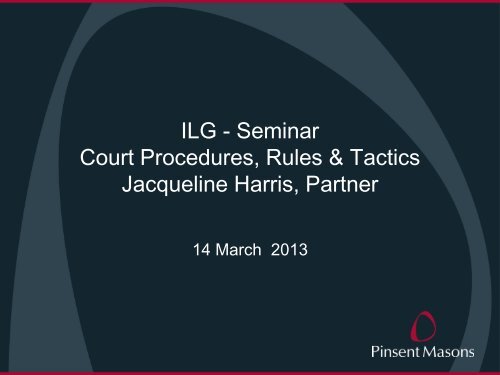
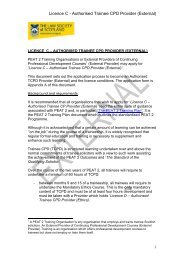
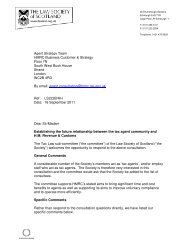
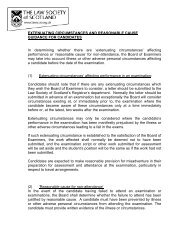
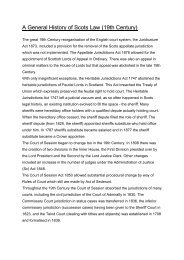
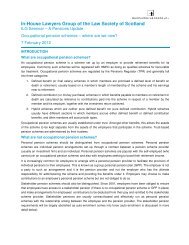
![BMA Consent form[1]. - Law Society of Scotland](https://img.yumpu.com/48530616/1/184x260/bma-consent-form1-law-society-of-scotland.jpg?quality=85)
